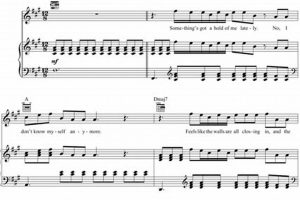
A plush toy designed to relinquish control over its actions can serve various purposes. For instance, a teddy bear might be equipped with a random movement generator, causing it to vibrate, shake,... Read more »

This phrase likely refers to the musical notation for a song, possibly titled “Lose Control” and featuring a character or motif named “Teddy Swims.” Sheet music provides a written representation of a... Read more »

The intersection of musical analysis (“chords”) with online search behavior (“Teddy Swims,” a musician known for his soulful voice and cover songs, and the concept of “losing control” likely relating to emotional... Read more »

A personalized ringtone featuring audio from a presumably viral video or meme involving a character identified as “Teddy” experiencing some loss of control while swimming has become popular. This audio clip, likely... Read more »

This phrase refers to a collaborative musical project between renowned vocalist Kelly Clarkson and rising artist Teddy Swims. It suggests a creative work exploring themes of vulnerability, emotional release, or surrender. This... Read more »

This phrase refers to the musical notation, specifically the piano chords, for the song “Lose Control” by the artist Teddy Swims. It signifies a resource sought by musicians wishing to learn, play,... Read more »

The phrase likely refers to a hypothetical or imagined scenario where a teddy bear, typically a symbol of childhood innocence and control, is subjected to a loss of control, specifically envisioned as... Read more »

Music similar to Teddy Swims’ “Lose Control” often features a blend of soulful vocals, raw emotion, and a genre-bending approach. This style typically incorporates elements of R&B, soul, and rock, sometimes with... Read more »

This concept refers to a metaphorical framework for understanding the process of relinquishing conscious control to achieve a desired outcome. Imagine a teddy bear thrown into water. If it rigidly resists the... Read more »

The phenomenon of plush toys, particularly teddy bears, becoming imbued with a sense of wild abandon and chaotic energy in the eyes of a child is a common experience. This can manifest... Read more »


